#Washburn House
Explore tagged Tumblr posts
Text
Design Clinic Final Presentation, Senior Ball, and Senior Banquet
My senior year is fast coming to a close. Only four days of classes remain and after that, four days of reading period, and four days of exams. So essentially, just 12 more days of being an undergraduate student. And as I’ve written about previously, this is very likely my final semester as a full-time student.
This week, in particular, I really felt like a senior as we had senior ball, senior banquet, and final presentations for Design Clinic (engineering design senior capstone). While I haven’t written extensively about Design Clinic here on my blog it’s been one of the main aspects of my senior year. The project I worked on over the course of the year with a team of three other senior engineers was entitled Design of a Satellite Communications System for Vehicles beyond the Reach of Cellular Connectivity and was sponsored by Iridium Communications. As this was a fairly formal presentation, I’d been quite nervous about it for the past few weeks and had to wear a nice jacket. Speaking of formalwear, one useful Smith resource to know about is the Lazarus Center’s Suit Yourself Program which enables current students to borrow clothes interviews. Fortunately, the presentation went pretty well and was followed up with a nice reception. While we still have two more classes, a wrap-up meeting with our liaisons, performance reviews, archival edits, and a digital archive to make, we’re essentially done which is absolutely surreal. After the reception, my parents and I went to Spoleto for dinner.

As for senior ball (which took place on Saturday night), while fun, I really feel that it should have been a free event. Finally, my house held its senior banquet on Sunday afternoon. During the event, we had a charcuterie board and lemonade. One tradition is to will things to non-seniors. In my case, I willed two small items I’d received at last year’s senior banquet. One of the items was a mini hardhat that I willed to a fellow engineering major. One of the main activities was writing fun collaborative stories for each of the seniors. Additionally, we got cute envelopes with nice notes from fellow Washburn residents.
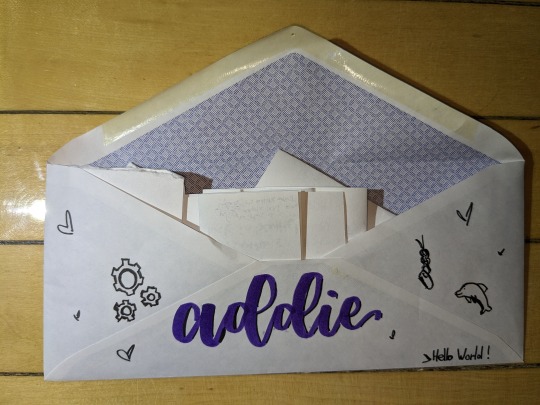
#college#Smith College#senior year#design clinic#senior ball#senior banquet#washburn house#Lazarus center
2 notes
·
View notes
Text
Drumroll please...
NO CC!! I present to you, Ella and Maya's home in Sunset Valley!! Formerly known as Mosquito Cove, I have renamed it to The Gardening Cabin. I just finished it this afternoon and uploaded it for you all to enjoy!
NO CC! One mod used for the Yoga mats, but not necessary for the build! Lot size: 40x30 I used items from almost every expansion pack for this build.
The Gardening Cabin http://www.simfileshare.net/download/4922080/






























Yoga Mod - Do Yoga, Meditate, Host Classes, & Train Sim by Twinsimming https://modthesims.info/d/671837/yoga-mod-update-2-27-24-hosted-meditation-null-fix.html
My YouTube!
www.youtube.com/@GoldenEnninasSims3
#the sims 3#mods#remastered#version 5#golden ennina#the washburn edition#ts3#package file#house#home#build#no cc#download#free#stunning#breathtaking#ella and maya
27 notes
·
View notes
Text
ROUND 1 MATCH 31: HUNTLOW VS. ZOE/WASH

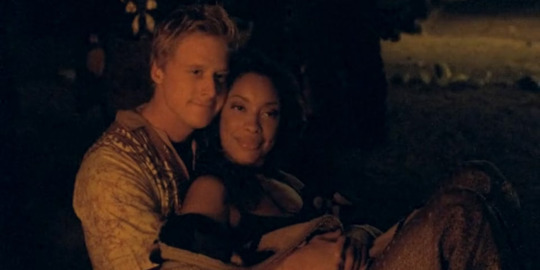
Huntlow Propaganda: "omg omg OK so Hunter is like mega strong still but like, when it comes to Willow he's so, like, pathetic and he just sorta listens to her and looks ay her." "hunter is an absolute wet cat and willow is an absolute TANK, if i remember correctly in the finale willow lifts him into her big beefy arms and twirls him, they are bi4pan, the girl who loves plants and the boy who literally grew underground <3"
Zoe/Wash Propaganda: "They love, like, and respect each other SO MUCH." "A happily married girlboss/malewife couple featuring Zoe, the stoic, battle-hardened first mate of the spaceship Serenity, and her goofy pilot husband Wash. Featuring moments such as: Wash tries to go on a mission, immediately gets taken hostage and tortured, and Zoe marches in and carries her poor husband out of there. A tradwife asks if Zoe wants to cook for her husband; one glance from Zoe has Wash laughing nervously and going, "Isn't she quaint?" When a hot woman tries to seduce Wash so she can steal their ship: Wash: [I'm] madly in love with a beautiful woman who can kill me with her pinky. Woman: I've been too forward. Wash: No. Well, yes. But I actually like that in a woman. That's part of why Zoe and I are, as previously mentioned, married. Woman: I thought... she didn't seem to respect you. Wash: Not everybody gets me and Zoe at first glance. [rambles about how much he loves Zoe until the woman, now extremely annoyed, simply knocks him unconscious] Zoe: If I'm gonna wear a dress, I want something with some slink. Wash: [overly excited] You want a slinky dress? I can buy you a slinky dress! Captain, can I have money for a slinky dress? Zoe, to the captain: Sir, I need you to take the helm, please. I need this man to tear all my clothes off. [grabs Wash by the collar of his shirt and drags him away] When both are being interrogated by the Alliance: Interrogator: Is there any particular reason you don't wish to discuss your marriage? Zoe: Don't see that it's any of your business, is all. We're very private people. [cuts to Wash's interrogation] Wash: The legs! Oh, yeah! I definitely have to say it was her legs. You can put that down! Her legs, and right where her legs meet her back. That... actually, that whole area. That and, and above it. Wash: [very enthusiastically] Have you seen what she wears? Forget about it. Have you ever been with a warrior woman?"
#polls#huntlow#hunter toh#hunter noceda#willow park#toh#the owl house#firefly#zoe washburne#hoban washburne
49 notes
·
View notes
Text
trans people can literally post pictures of themselves eating ice cream with their family and friends where everyone has huge smiles and is hugging and it's captioned sthg like "i'm so blessed i love life !" and cunts will still go "SO SAD THIS POOR MENTALLY ILL FREAKAZOID THEY MUST HAVE DADDY ISSUES THEY'RE LIVING A NIGHTMARE ALL BECAUSE OF THE TRAINS GANDER IDEOLOGY THEY'RE GOING TO 41%"
#this is about dale washburn georgia house representative#<- a trans girl's mom emailed him talking about how much better her daughter's life has been since transitioning#and urging him not to vote in favor of anti-trans laws#and he responded with ''i'm sorry your son is mentally ill it must be hard for you''
2 notes
·
View notes
Text
The Cast - the Washburn-Hooper(s?)

Less of a formal family and more of a 'two college friends trying to make it out alive out here', the Washburn-Hooper family doesn't lack for entertainment factor. If their business struggles won't appeal or appall, perhaps their clothing and interior decoration sense will?

Jennifer Washburn is a peppy, colorful, and extroverted go-getter. It was she who approached her cohort in all-things-poorly-advisable in college to strike up their friendship, and she who hatched their business plans after spontaneously coming across a derelict building for sale while out on a walk. Running a business straight out of (dropped out) college might not sound like a grand idea to most, but Jenni has hopes! High ones. She is the one responsible for most of the decoration around the house as well.

Haven Hooper is a hopeless nepotism baby, obsessed with all things beautiful and vaguely 'artsy', Jennifer's manic-pixie-nightmare personality appealed to her strongly enough so as to implore her parents fund their little business venture, and their housing. Money is no object to her, and that much can be gleaned by their means of living. She tends to go along with Jennifer and facilitates all of her bad ideas with her endless well of money.
#The Cast#the washburn hoopers#ts4 legacy#ts4#i will post their house later i was actually proud of it
0 notes
Text
During the 35th United States Congress, on February 5, 1858, he was physically attacked by Democrat Laurence M. Keitt in the House chambers, leading to a brawl between northerners and southerners. Keitt, offended by Grow's having stepped over to his side of the House chamber, dismissively demanded that Grow sit down, calling him a "black Republican puppy". Grow responded by telling Keitt that "No negro-driver shall crack his whip over me." Keitt became enraged and went for Grow's throat, shouting that he would "choke [him] for that". A large brawl involving approximately fifty representatives erupted on the House floor, ending only when a missed punch from Rep. Cadwallader Washburn upended the hairpiece of Rep. William Barksdale. The embarrassed Barksdale accidentally replaced the wig backwards, causing both sides to erupt in spontaneous laughter.[4][5][6]
imagine...
35 notes
·
View notes
Text

[Langston Hughes]
* * * *
LETTERS FROM AN AMERICAN
November 3, 2024
Heather Cox Richardson
Nov 03, 2024
I’m home tonight to stay for a bit, after being on the road for thirteen months and traveling through 32 states. I am beyond tired but profoundly grateful for the chance to meet so many wonderful people and for the welcome you have given me to your towns and your homes.
I know people are on edge, and there is maybe one last thing I can offer before this election. Every place I stopped, worried people asked me how I have maintained a sense of hope through the past fraught years. The answer—inevitably for me, I suppose—is in our history.
If you had been alive in 1853, you would have thought the elite enslavers had become America’s rulers. They were only a small minority of the U.S. population, but by controlling the Democratic Party, they had managed to take control of the Senate, the White House, and the Supreme Court. They used that power to stop the northerners who wanted the government to clear the rivers and harbors of snags, for example, or to fund public colleges for ordinary people, from getting any such legislation through Congress. But at least they could not use the government to spread their system of human enslavement across the country, because the much larger population in the North held control of the House of Representatives.
Then in 1854, with the help of Democratic president Franklin Pierce, elite enslavers pushed the Kansas-Nebraska Act through the House. That law overturned the Missouri Compromise that had kept Black enslavement out of the American West since 1820. Because the Constitution guarantees the protection of property—and enslaved Americans were considered property—the expansion of slavery into those territories would mean the new states there would become slave states. Their representatives would work together with those of the southern slave states to outvote the northern free labor advocates in Congress. Together, they would make enslavement national.
America would become a slaveholding nation.
Enslavers were quite clear that this was their goal.
South Carolina senator James Henry Hammond explicitly rejected “as ridiculously absurd, that much lauded but nowhere accredited dogma of Mr. Jefferson, that ‘all men are born equal.’” He explained to his Senate colleagues that the world was made up of two classes of people. The “Mudsills” were dull drudges whose work produced the food and products that made society function. On them rested the superior class of people, who took the capital the mudsills produced and used it to move the economy, and even civilization itself, forward. The world could not survive without the inferior mudsills, but the superior class had the right—and even the duty—to rule over them.
But that’s not how it played out.
As soon as it became clear that Congress would pass the Kansas-Nebraska Act, Representative Israel Washburn of Maine called a meeting of thirty congressmen in Washington, D.C., to figure out how they could fight back against the Slave Power that had commandeered the government to spread the South’s system of human enslavement. The men met in the rooms of Representative Edward Dickinson of Massachusetts—whose talented daughter Emily was already writing poems—and while they came to the meeting from all different political parties, often bitterly divided over specific policies, they left with one sole purpose: to stop the overthrow of American democracy.
The men scattered back to their homes across the North for the summer, sharing their conviction that a new party must rise to stand against the Slave Power. They found “anti-Nebraska” sentiment sweeping their towns; a young lawyer from Illinois later recalled how ordinary people came together: “[W]e rose each fighting, grasping whatever he could first reach—a scythe—a pitchfork—a chopping axe, or a butcher’s cleaver.” In the next set of midterm elections, those calling themselves “anti-Nebraska” candidates swept into both national and state office across the North, and by 1856, opponents of the Slave Power had become a new political party: the Republicans.
But the game wasn’t over. In 1857, the Supreme Court tried to take away Republicans’ power to stop the spread of slavery to the West by declaring in the infamous Dred Scott decision that Congress had no power to legislate in the territories. This made the Missouri Compromise that had kept enslavement out of the land above Missouri unconstitutional. The next day, Republican editor of the New York Tribune Horace Greeley wrote that the decision was “entitled to just so much moral weight as would be the judgment of a majority of those congregated in any Washington bar-room.”
By 1858 the party had a new rising star, the young lawyer from Illinois who had talked about everyone reaching for tools to combat the Kansas-Nebraska Act: Abraham Lincoln. Pro-slavery Democrats called the Republicans radicals for their determination to stop the expansion of slavery, but Lincoln countered that the Republicans were the country’s true conservatives, for they were the ones standing firm on the Declaration of Independence. The enslavers rejecting the Founders’ principles were the radicals.
The next year, Lincoln articulated an ideology for the party, defining it as the party of ordinary Americans defending the democratic idea that all men are created equal against those determined to overthrow democracy with their own oligarchy.
In 1860, at a time when voting was almost entirely limited to white men, voters put Abraham Lincoln into the White House. Furious, southern leaders took their states out of the Union and launched the Civil War.
By January 1863, Lincoln had signed the Emancipation Proclamation ending the American system of human enslavement in lands still controlled by the Confederacy. By November 1863 he had delivered the Gettysburg Address, firmly rooting the United States of America in the Declaration of Independence.
In that speech, Lincoln charged Americans to rededicate themselves to the unfinished work for which so many had given their lives. He urged them to “take increased devotion to that cause for which they gave the last full measure of devotion, that we here highly resolve that these dead shall not have died in vain, that this nation, under God, shall have a new birth of freedom, and that government of the people, by the people, for the people, shall not perish from the earth.”
In less than ten years the country went from a government dominated by a few fabulously wealthy men who rejected the idea that human beings are created equal and who believed they had the right to rule over the masses, to a defense of government of the people, by the people, for the people, and to leaders who called for a new birth of freedom. But Lincoln did not do any of this alone: always, he depended on the votes of ordinary people determined to have a say in the government under which they lived.
In the 1860s the work of those people established freedom and democracy as the bedrock of the United States of America, but the structure itself remained unfinished. In the 1890s and then again in the 1930s, Americans had to fight to preserve democracy against those who would destroy it for their own greed and power. Each time, thanks to ordinary Americans, democracy won.
Now it is our turn.
In our era the same struggle has resurfaced. A small group of leaders has rejected the idea that all people are created equal and seeks to destroy our democracy in order to install themselves into permanent power.
And just as our forebears did, Americans have reached for whatever tools we have at hand to build new coalitions across the nation to push back. After decades in which ordinary people had come to believe they had little political power, they have mobilized to defend American democracy and—with an electorate that now includes women and Black Americans and Brown Americans—have discovered they are strong.
On November 5 we will find out just how strong we are. We will each choose on which side of the historical ledger to record our names. On the one hand, we can stand with those throughout our history who maintained that some people were better than others and had the right to rule; on the other, we can list our names on the side of those from our past who defended democracy and, by doing so, guarantee that American democracy reaches into the future.
I have had hope in these dark days because I look around at the extraordinary movement that has built in this country over the past several years, and it looks to me like the revolution of the 1850s that gave America a new birth of freedom.
As always, the outcome is in our hands.
“Fellow-citizens,” Lincoln reminded his colleagues, “we cannot escape history. We…will be remembered in spite of ourselves.”
LETTERS FROM AN AMERICAN
HEATHER COX RICHARDSON
#Letters From An American#Heather Cox Richardson#Abraham Lincoln#history#American History#democracy#Civil War#political parties#slavery#mudsills#Declaration of Independence#US Constitution#Langston Hughes#Kansas-Nebraska Act#fellow citizens#us election 2024
8 notes
·
View notes
Text
Autumnal Reads

Autumn Chills by Agatha Christie
The Pumpkin Spice Cafe by Laurie Gilmore
Anne Of Green Gables by L.M Montgomery
The Midnight Club by Christopher Pine
If We Were Villains by M.L. Rio
How To Sell A Haunted House by Grady Hendrix
Hallowe'en Party by Agatha Christie
Accidentally Amy by Lynn Painter
The Cinnamon Bun Bookstore by Laurie Gilmore
Pumpkin Roll by Josi S. Kilpack
The Halloween Tree by Ray Bradbury
Pumpkinheads by Rainbow Rowell
The Secret History by Donna Tartt
The Ex Hex by Erin Sterling
The Pumpkin Muffin Murder by Livia J. Washburn
Death of a Neighbourhood Witch by Laura Levine
Her Favorite Jack-O-Lantern by Rebecca Rennick
Halloween Fiend by C.V. Hunt
#books#book blog#booklr#book reccs#readblr#book recommendations#bookblr#bookaddict#bookworm#books and reading#autumn#autumnal books#autumn books#fall#fall books#romance#mystery#murder#dark academia#halloween
9 notes
·
View notes
Text


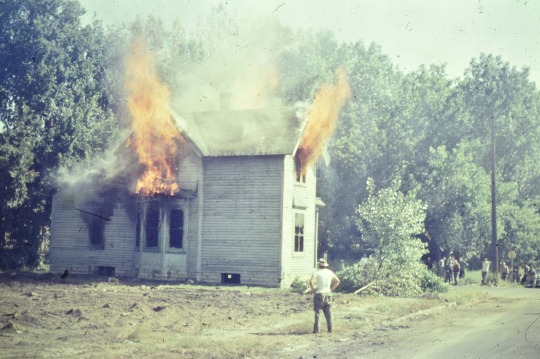
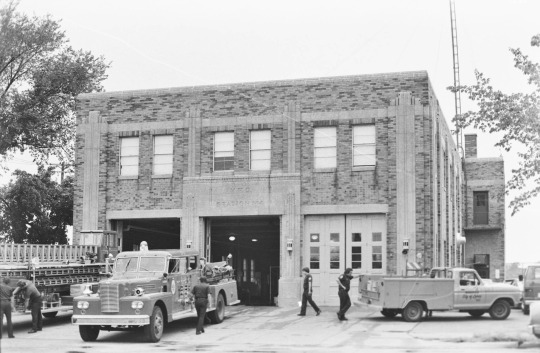



Don't Play with Fire
October is Fire Prevention Month. Browse over 2,000 photos of ferocious fires, fire aftermath, flame girls, fire trucks, firefighters, fire-related injuries, and fire safety demonstrations in the Hennepin County Library Digital Collections—a good visual reminder to not play with fire.
Photos top to bottom:
Fire at Pierce Skate and Ski, 1974 (C49286)
Egekvist Bakery Economy Store Fire, 1970 (C07834)
House at 1200 4th Ave. N on fire, undated (C49291)
Fire station No. 4, 1101 6th St. N (MHPC002304)
Washburn-Crosby Mill After Fire, 1991 (C60440)
Goodman Overcoat Building Fire, 1974 (MFD0149)
Fire Trucks in Minneapolis Fire Station No. 6, 30 13th St. S, 1974 (C49651)
See more fire and fire department posts from the past on our Tumblr.
#fires#Minneapolis Fire Department#fire departments#fire prevention month#Minneapolis#Minnesota#fire fighting#fire fighters#fire stations
46 notes
·
View notes
Text
'Of all the fascinating people who came into J. Robert Oppenheimer’s life during his years at UC Berkeley, few are as intriguing — or as tragic — as Jean Tatlock, the woman some believe was the love of his life.
Oppenheimer was 25 when he arrived on the Berkeley campus in 1929 as an associate professor of physics. He moved into 2665 Shasta Road, up the windy, steep hills that flank the university. From the windows, he could see the bay.
The Shasta Road property was always lively. In the main house, Oppenheimer’s landlord Mary Ellen Washburn hosted constant parties; intellectuals roved in and out of the property, debating ideas and drinking late into the night. Oppenheimer objected to teaching before 11 a.m. so he could stay up chatting and smoking.
In the spring of 1936, Oppenheimer met a young woman named Jean Tatlock at one of these parties. He already knew her father, an acclaimed Berkeley professor of Old English; professor John Tatlock enjoyed having lunch with Oppenheimer at the Faculty Club, where Oppie, as he was known around campus, showed off his wide-ranging knowledge of literature and ability to recite passages from memory.
Jean was 22 and brilliant. She was in her first year at Stanford Medical School, studying to be a psychiatrist. This, of course, was highly unusual for a woman in the 1930s, and Tatlock made an impression. Friends and acquaintances recalled she was the type of person everyone noticed when she walked into a room. (Florence Pugh was cast as Jean Tatlock in Christopher Nolan’s “Oppenheimer” movie.)
#OPPENHEIMER will have its French premiere on July 11th at the Grand Rex in Paris. pic.twitter.com/W0o25gL6cy
— Florence Pugh Photos (@pughphotos) June 29, 2023
Oppenheimer, who loved sharp, unconventional women, fell fast. By the fall, the pair were an item, and something of an intellectual power couple. Oppenheimer was the star of the physics department, luring talent from all over the nation to join him. Tatlock was a trailblazing psychiatrist who delighted Oppenheimer with her love of poets like John Donne. “All of us were a bit jealous,” one friend recalled in “American Prometheus,” the definitive Oppenheimer biography.
Their relationship, though, was a tumultuous one. Tatlock went through periods of deep depression, and Oppenheimer was often the person who talked her through them. When she was low, so was he. “American Prometheus” detailed how Robert Serber, a nuclear physicist who met Oppenheimer at Berkeley and became one of his closest friends, watched their relationship unfold.
“He’d be depressed some days because he was having trouble with Jean,” Serber said.
Over the course of three years, they got engaged at least twice, broke things off and kept getting back together. Serber said Tatlock would cut contact with Oppenheimer for weeks or even months. When she returned, Serber said she would “taunt him about whom she had been with and what they had been doing. She seemed determined to hurt him, perhaps because she knew Robert loved her so much.”
In retrospect, it seems clear at least some of this tumult was due to Tatlock’s struggle to understand her own sexuality. In letters to friends, she expressed fear that she might be attracted to women. The thought tormented her — she was then a student of Freudian psychiatry, which maligned homosexuality as a mental defect. Torn between her genuine love for Oppenheimer and her anguished confusion, Tatlock called things off for good in 1939. A year later, Oppenheimer’s new love, a married woman named Kitty Harrison, became pregnant with his child. Her husband agreed to a divorce, and Harrison and Oppenheimer married in 1940.
When a friend asked Tatlock if she regretted not marrying Oppie, she said she did. Maybe she would have married him if she wasn’t “so mixed up,” Tatlock lamented.
But their relationship did not end — and their affair would have profound implications for both of them.
---
Between 1939 and 1943, it’s believed Oppenheimer continued seeing Tatlock several times a year. They still went to parties together in Berkeley, and at least once they got drinks at the Top of the Mark. When she was feeling low, she’d call Oppie and he’d talk to her for as long as it took to see her through the dark moment. In early 1943, he left for Los Alamos to head the Manhattan Project. No one could know the details of his work in the New Mexico desert. Oppenheimer left Tatlock without saying goodbye.
For Tatlock, who relied on Oppenheimer for support, this was a devastating abandonment. He couldn’t explain what had taken him away, and she wrote him pleading letters. By then, she had become a doctor at Mount Zion Hospital in San Francisco (today, it’s part of the UCSF campus). It was an incredible feat of determination in the male-dominated field, but despite her professional success, loved ones knew that Tatlock was not well.
On June 14, 1943, Oppenheimer flew from Los Alamos to see her. Unbeknownst to him, he was being tailed by military officers. In their report to the FBI, they said they watched Oppenheimer take the train from Berkeley to San Francisco, “where he was met by Jean Tatlock who kissed him.” They went to Xochimilco, a Mexican restaurant on Powell and Broadway, and had dinner and drinks. Then, they went back to her top floor apartment at 1405 Montgomery St., a pretty block tucked right underneath Coit Tower. With the spies watching from the street below, the lights went out at 11:30 p.m.
The next morning, Oppenheimer emerged from the flat. They had one last meal together at Kit Carson’s Grill before Tatlock drove him to the airport. He hopped a flight back to New Mexico, and she went home. Soon, FBI Director J. Edgar Hoover had a report about their meeting in his hands.
Both were already on his radar. For much of Tatlock’s adult life, she had been a dues-paying, meeting-attending communist. She even wrote for the Communist Party’s official West Coast publication, the Western Worker. Hoover, with his characteristic paranoia, became convinced Tatlock might be passing nuclear secrets to the Soviets. “It has been determined that Jean Tatlock … has become the paramour of an individual possessed of vital secret information regarding this nation’s war effort,” Hoover wrote in a memo. He had the phone in Tatlock’s Montgomery Street apartment tapped.
There is no evidence Tatlock was any sort of spy, or that she even knew what Oppenheimer was doing at Los Alamos. In 1954, when Oppenheimer was interrogated over accusations he was a Communist sympathizer, he was asked why he flew to see Tatlock in 1943. “Because,” he answered, “she was still in love with me.”
Tatlock’s mental health deteriorated further in the months after their meeting. Around the start of the new year 1944, Tatlock stopped answering her phone. Fearing the worst, her father drove to her apartment on Jan. 4, 1944. He had to climb through an open window to get inside. There, he found his daughter in the bathtub. Jean Tatlock was dead. She was just 29.
Immediately after finding her, her father did an odd thing: He lit a fire and burned her letters and photos. A few hours later, he finally called a funeral parlor. That funeral parlor called police, who arrived at 1405 Montgomery to find a dead woman and a pile of burned paper. Although no one now living knows what those items were, many historians believe it may have been evidence that Tatlock was lesbian or bisexual.
Much has been made of the unusual circumstances of her death over the years, particularly because an autopsy found she’d eaten a full meal before dying. Some believed she was murdered by the government. But Tatlock left a handwritten suicide note and endured a lifetime of clinical depression, so most who knew her best did believe she ended her own life.
Sequestered at Los Alamos, the Serbers received a cable from Oppenheimer’s former landlady at Shasta Road. It informed them that Tatlock had died the day before. Robert Serber rushed to find Oppenheimer and break the news to him before someone else did. He was too late. “Deeply grieved,” Oppenheimer went for a long, solitary walk in the hills surrounding Los Alamos.
“Jean was Robert’s truest love,” Serber said. “He loved her the most. He was devoted to her.”
Tatlock’s family had her remains sent to Albany County, New York, where she was buried in the family plot. Her stone is simple. It reads:
Jean Frances Tatlock 21 February 1914 4 January 1944
---
In 1962, Gen. Leslie Groves, the military leader of the Manhattan Project, wrote to Oppenheimer asking why he had named the first atomic bomb test “Trinity.”
“Why I chose the name is not clear, but I know what thoughts were in my mind,” Oppenheimer replied. “There is a poem of John Donne, written just before his death, which I know and love.”
The poem he quoted was called “Hymn to God, My God, in My Sickness.”
I joy, that in these straits I see my west; For, though their currents yield return to none, What shall my west hurt me? As west and east In all flat maps (and I am one) are one, So death doth touch the resurrection.'
#Oppenheimer#Jean Tatlock#Florence Pugh#American Prometheus#John Donne#Leslie Groves#Hymn to God My God in My Sickness
34 notes
·
View notes
Text
Spring Weekend 2023
Happy first day of April! Believe it or not, graduation is now 50 days away! Earlier today, we had our Spring Weekend celebration which is an annual house event/party that is held in late March or early April. You can read about my last year's Spring Weekend at the respective link.
This year the main activity was making flower crowns. To do so, we essentially just attached flowers and other plant materials to a round of wire using floral tape. Floral tape is pretty cool as it doesn’t become sticky until it is stretched. I didn’t really have the patience or artistic vision to make a full crown, but I did add a few purple flowers and a blue ribbon to my wireframe.

The next main activity was painting small canvases to spell out Washburn. Again, as I’m not much of an artist, I just hung out while others painted. Besides, I had to leave the event a bit early to film a video for my Design Clinic project.

In addition to the crafting activities, we had a lovely spread of fruit, cheese, charcuterie, and crackers. We also had mocktails containing grapefruit juice, lemonade, and seltzer.
0 notes
Text
Galena, Illinois
One of my favorite places to visit is the town of Galena in the north-west corner of Illinois. It is a popular weekend getaway location for Chicago and Chicago suburb residents. My parents used to visit it over the weekend when I was a baby, but unfortunately I don't remember any of those trips! I had the fortune of visiting the town in 2021 and again in 2022.
It is a beautiful old-fashioned town surrounded by beautiful countryside. In the 19th-century, it was a lead mining town, hence the name "Galena." During the ice age, the land was not flattened by glaciers which is why the town is hilly, despite being in the midwest.
In the 19th-century, it was a very prosperous mining town and was more populous than Chicago from the 1830s to the 1860s. It was located on a stream connected to the Mississippi, making it also a trading town. As you can see in this photo, the silt thrown up by the frequent steamboats shrunk the steam and made it too shallow to steam through. Here are also some artworks housed at the Galena history museum of Galena during its peak.




The highway to Galena is the Ulysses S. Grant highway! :) That's Elihu Washburne's house in the background, too! I haven't gotten to visit it yet...

This is the post office that was built by Ely S. Parker, a member of Grant's staff during the Civil War and later U.S. Commissioner of the Bureau of Indian Affairs.

Here is Main Street!




This is the Galena Methodist Church that the Grants attended!


The train station!

This is the history museum! I will post more about it later :)

As I said earlier, there are a lot of hills...

This is the oldest home in Galena, the Dowling House. They have tours! It is also supposedly haunted.

7 notes
·
View notes
Photo
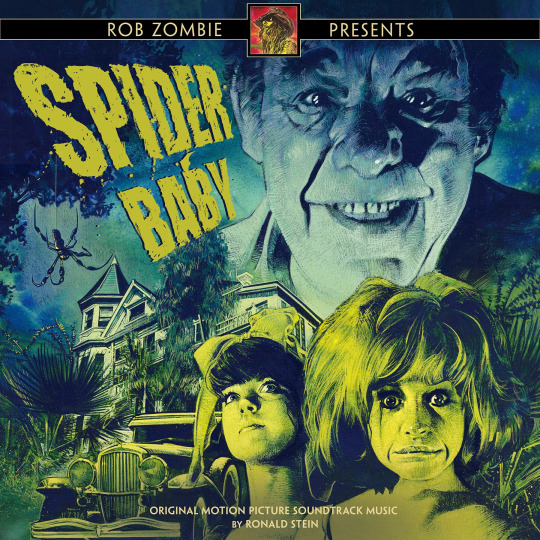
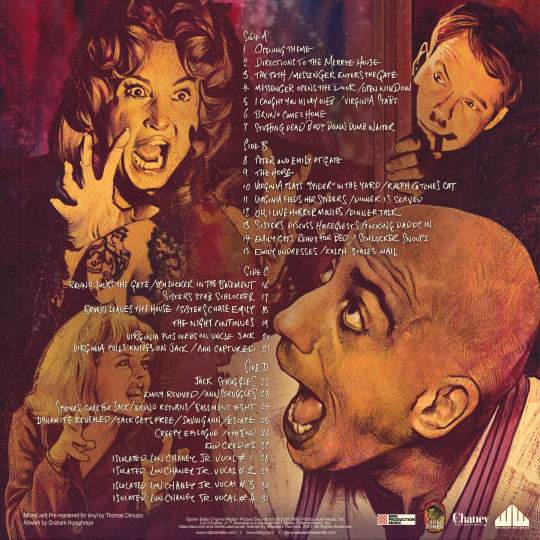


Spider Baby’s original motion picture soundtrack is available on vinyl for $40 via Waxwork Records. It’s the second installment under the Rob Zombie Presents banner following White Zombie.
Composed by Ronald Stein (The Little Shop of Horrors, Dementia 13), the 2xLP album is pressed on 180-gram blue & green marble colored vinyl. It’s housed in a gatefold jacket with matte satin coating featuring art by Graham Humphreys.
The package includes an interview with director Jack Hill and actress Beverly Washburn by Rob Zombie, a 12x12 booklet featuring photographs from Hill’s personal archive, and a 12x12 art insert.
#spider baby#rob zombie#horror#jack hill#sid haig#beverly washburn#waxwork records#vinyl#gift#soundtrack#graham humphreys#60s horror#1960s horror#lon chaney jr.#lon chaney
30 notes
·
View notes
Text
Explore my bookshelf!
Tagged by @theghostinthemargins, thank you <3
An estimate of how many physical books I own: probably around 500-750, but the bulk of my "collection" is at my parent's house. I buy 90% of my books second hand.
Favorite author: Tolkien is the obvious one. Besides him, I always enjoy N.K. Jemisin, Octavia Butler, Sayaka Murata, Natsuo Kirino, Angela Carter, Christina Rossetti, Banana Yoshimoto and others.
A popular book I've never read and never intend to read: The Love Hypothesis and related books... I don't think they're the death of literature or anything, but I have no interest in them.
A popular book I thought was just meh: Megan Nolan's Acts of Desperation was good but not great.
Longest book I own: The 2016 Washburn edition of The Tale of Genji comes out at 1320 pages, so I believe it wins this one.
Longest series I own all the books to: The Histories of Middle Earth, of which I own all twelve books plus the index.
Prettiest book I own: Angela Carter's Book of Fairy Tales. Look at it! The woodblock prints by the author included in Amy Jeff's Storyland and Wild are also really beautiful.
A book or series I wish more people knew about: I need the tumblr cannibalism enjoyers to get into Sayaka Murata's Earthlings and Life Ceremony. Truly wrenching and thought-provoking gore and darkness here.
Book I'm reading now: I'm in a bit of a reading slump at the moment, but I picked up Han Kang's The White Book and Flaubert's Three Tales from the library to hopefully bring me out of it.
Book that's been on my TBR list for a while but I still haven't got around to it: Our Wives Under the Sea by Julia Armfield has been on my shelf for a while despite all indicators suggesting I'd like it. I'm hoping I'll read more when I start commuting to work again.
Do you have any books in a language other than English: A couple of poetry and short story collections in both Japanese/Korean and English, otherwise no.
Paperback, hardcover, or ebook? Paperbacks because I like flicking through them and they're easier to store, hardbacks because pretty, ebooks because I can read them on my phone wherever.
no pressure tags for @imakemywings @meadowlarkx @polutrope @jouissants @aipilosse @matrose @mirillel and @welcomingdisaster <3
17 notes
·
View notes
Text
Favorite photos I’ve taken

Sunset on the drive to Georgia

New Year’s Eve foggy night on the St. Simons Island Pier

Old Building in Downtown Topeka, I wonder what it used to be

Flight to Amsterdam got delayed so I spent a day at the New England Aquarium in Boston, got this amazing foggy view

The canals in Amsterdam are magnificent, I love them


Zaadam North, Netherlands. Silly little duck I saw while crossing a bridge, he’s very photogenic!

Zaandam North, Netherlands. Though it’s the back of the windmill, it still looks great with the Dutch flag there.


Giethoorn, Netherlands. Some houses along the canal. The roof style is really fun!

Back in Amsterdam, got to see The Dancing Houses on my last day there



Garden of the Gaasbeek castle in Belgium. My grandma tried to convince the workers at the castle to let her buy it because the Gaasbeek are our ancestors. She failed



Monschau, Germany! Got to visit this town with my little cousin who lives in the Netherlands, she’s a demon. She kept chasing me while yelling in Dutch, the fact I couldn’t understand her was terrifying.

St. Paul’s Cathedral, London, England. Climbed to the top with my grandma, I got in trouble with one of the ladies working up at the top of the building because my grandma couldn’t climb up the rest of the stairs and told me to go to the top by myself, people under 16 aren’t allowed to climb it by theirselves. Getting in trouble by a lady with a heavy British accent is scary, I had to pull out the “Yes, ma’am.” 💀 We eventually got to the top tho!

Got to see the Elizabeth Tower, it’s definitely a sight to see! I’ve wanted to visit Big Ben ever since I was little. Though it’s not the actual clock part of the tower, I thought this shot was nice

Took a tour around London and visited places around the city that brought music to life! I was told this house was Jimi Hendrix’s home (correct me if I’m wrong). link to the website for the tour I took: www.LondonRockTour.com


Zen Garden that Washburn University installed for their Japanese exchange students to feel more at home.

Words cannot describe how beautiful this sunset is in front of my Taekwondo School.
#photography#st pauls cathedral#london#germany#amsterdam#holland#the netherlands#belgium#Gaasbeek Castle#London Rock Tour#europe
2 notes
·
View notes
Text


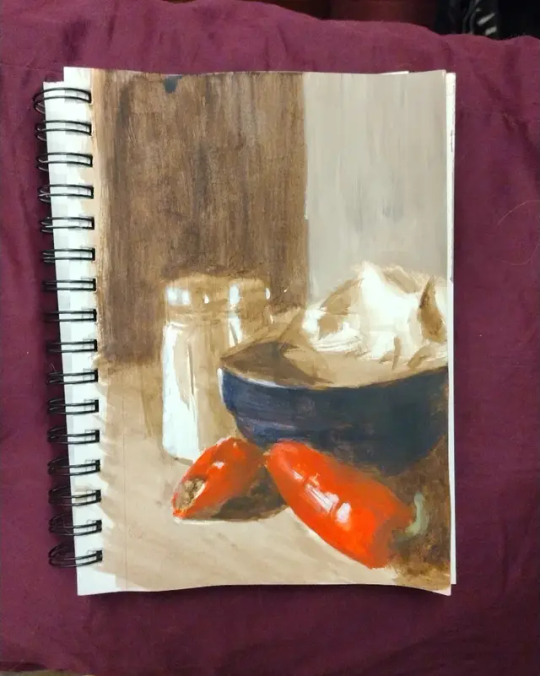

I took a reference photo for a still life when I was house sitting last week, at a lovely place in the woods outside Washburn and didn't get around to painting it, but I started it a couple days ago and you can see in this first picture of the monochrome underpainting, that Sheldon absolutely insisted on offering a helping paw in the process!
I appreciate the gesture but no thanks, littol lion man, I can handle this on my own...
This isn't by any means a perfectly executed painting, the tortilla chips are not at all recognizable as such but I feel like I'll just ruin everything I've done so far if I keep putzing with it so I'm leaving it as is, at least for now!
Also, Sheldon really wanted to help out, he hopped up onto it as it was drying. So, I tried to fix it a bit but it's not exactly as it was. He left his mark, one way or another lol.
There's going to be a Staff Art Show at the Black Cat coffee house, in October (I think) and by then I will hopefully have a few more decent paintings to choose from for my own contribution to the affair, we'll see! I know there are quite a few creative folks on staff at the bakery and coffee shop so, I expect a lot of cool inspiring things to look at!
#Acrylic painting#peinture acrylique#acrylic#painting#peinture#art#artwork#traditional art#still life#Home#kitchen#food#Peppers#Bowl#Chips#salt and pepper#learning#practice
5 notes
·
View notes